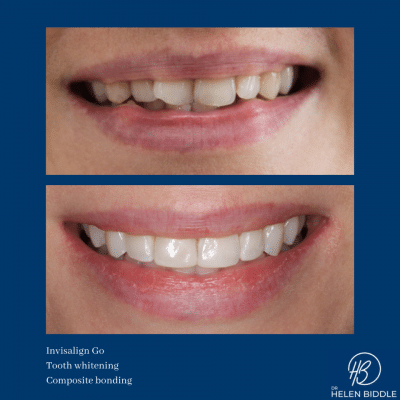Treatments
We do everything possible to ensure that your dental examination with us is a pleasant experience.
Your first consultation will be free of any treatment and will focus on your dental needs and wishes. We will ask you about your previous dental experiences and discuss ways to make your visits as relaxed and stress-free as possible.
What to expect during your first visit?
At your examination appointment the dentist may:
Several of our dentists have completed further training and achieved postgraduate qualifications in the treatment of nervous patients. Feel free to advise the dentist in advance of any of your concerns when you book an appointment.
Our new patient examination will cost no more than £70 for a 30-minute consultation and two x-rays. We will provide you with a cost analysis and a printed estimate for any proposed dental treatments.
Tooth whitening is the process of lightening the natural colour of your teeth without damaging the tooth surfaces.
As we grow older our teeth are getting darker. This is partly due to the ageing process, but also due to the food and drink we consume and certain habits like smoking. Drinks like tea, coffee and red wine and certain foods like curries and berries have food colourings that will all contribute to a darkening of your natural tooth colour.
The duration of the treatment depends on how discoloured your teeth are and the shade you wish to achieve. Tooth whitening takes between two to four weeks to complete and lightens the natural colour of your teeth up to 5 to 8 shades whiter.
Dental hygienists and therapists are specially trained to provide care of the teeth and gums and to promote good oral health.
The hygienist’s main work is to professionally clean the patient’s teeth using an ultra-sonic cleaner or other hand instruments. This is often referred to as a ‘scale and polish’. The process removes plaque, which is a sticky coating that forms constantly on the teeth, and tartar (calculus), which is a hard deposit that builds up on the teeth. Plaque and tartar play an important part in the causes of gum disease.
Recent research has shown that smokers get more gum infections and lose more teeth than non-smokers. The hygienist will work closely with smokers not only to remove staining but also to slow down the rate of gum disease.
Hygienists are experts at teaching you to look after your teeth and gums. Regular professional cleaning, combined with an individually tailored cleaning routine at home, will keep your mouth healthy and infection free. A clean and healthy mouth will improve your appearance, help you to retain your teeth and give you a fresh breath.
Teeth may not last forever even with the advances in modern dentistry. Dental professionals have many options for replacing lost or extracted teeth – among them: implants, bridges and removable partial dentures.
The colour, shape and design of Valplast Flexible Partials blend in well with the natural appearance of the gums, making the partial virtually invisible.

A dental implant is an excellent way to replace a missing tooth. Implants are small metal screws (usually made of titanium or a titanium alloy) that are placed into the jawbone to act like artificial tooth roots. Over time, they fuse to the jawbone and a restoration (false, yet natural-looking tooth) is fitted on top. Dental implants can be used to replace a single tooth or many teeth.
We offer several finance options including 0% finance to spread the cost of implant treatment over a period of time.
The most amazing dentist I have ever been to. A* all round.
Rebecca P

